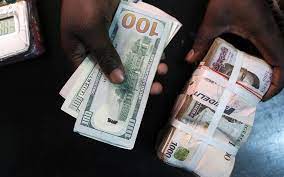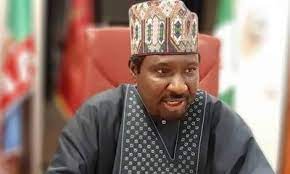The recent call by Emir of Kano and former CBN governor, Mallam Muhammad Sanusi II for further devaluation of the naira has raised a lot of argument in the nation’s financial system. In this report AMAKA IFEAKANDU captures experts response on the proposal. Excerpts.
The recent call by Emir of Kano and former Governor of the Central Bank of Nigeria (CBN) , Mallam Muhammad Sanusi II for devaluation of the local currency, the naira has continued to generate a lot of controversy in the nation’s financial system.
Sanusi had last week kick against the CBN and the federal government decision not to further devalue the nation’s currency, and also to retain fuel subsidy. Reacting against CBN views he said “it is wrong to continue with the fuel subsidy. It is wrong to continue to pretend that you can keep the naira at a certain level, when the price of oil is falling, without depleting your reserves. You have to make a choice.”
that with the present value of the naira, “it does not speak well of us to pretend that the naira is appropriately valued.”
He said the CBN adopted a demand management exchange policy, whereby it had deprived certain industries of imports. According to him, those that can afford to import are not able to do so because they have been excluded from the market. He also called for a complete removal of the subsidy on fuel.
“We won’t know the impact of this, until we look at the gross domestic product (GDP) growth. At the same time we have continued with tight monetary policies. I pursued tight monetary policies. But at that time, we were attracting portfolio flows and we needed to have a stable exchange rate, we need to have a healthy balance of payment situation,” he argued.
Some financial operators who reacted over Sanusi statement said it is not necessary for the CBN to devalue the local currency.
Managing Partner, Matog Consulting, Mr Matthew Ogagavworia, who supported that CBN should not devalue the naira said the demand elasticity for most Nigeria exports are not price elastic. Making Nigeria exports cheaper will only lead to negligible increases in exports volumes. The value of the exports in relative terms may fall thereby worsening current account position.”
“The global economy as at today is not in the best position. Devaluing our currency may not boost exports as global demand is currently sluggish”
He said once there is increase in cost of production, companies could easily pass it on customers in order to maintain profits but at reduced volumes.
This according to him would thus constrain production, leading to cut-backs and hence loss of jobs and increases in un-utilized capacity of companies with attendant costs.
He pointed out that Nigerian products are currently not competitive in the world market due to other factors as: interest rates, power, security, technology available and not currency exchange rates, stressing that any attempt to devalue the Naira will mean that CBN will be compelled to raise interest rates in an effort to curb inflation, which in turn negatively affect production of goods and services, slowing down economic growth further.
Speaking further he said with naira devaluation, the value of wages of fixed-income workers and those individual income earners who cannot raise their wages will be confronted, with the consequence of lower standards of living.
He explained that when a country devalues its currency, it means that the value of foreign investor’s assets in the Country will be lower, relative to the Dollar, thereby increasing their foreign exchange losses.
This can injure foreign investor confidence and therefore negatively impact on the country’s push for foreign direct investment.
Also, a recent report from analysts at CSL Stockbrokers Limited explained that since Nigeria imports most of the goods it consumes, devaluation could lead to a further increase in the price of imported goods, stressing that the CBN has chosen a populist stance.
According to analysts “Despite the many calls for devaluation, the recent steps taken by the current administration to block leakages and monitor government revenues may lead to an increase in much-needed government revenues while increasing foreign exchange reserves forex reserves have risen 9 per cent since the beginning of July). This may help sustain the naira at current levels in the short to medium term,” the report added.
An economist, Mr Ifeanyi Chigbuo in his response said devaluation of the nairawould make goods exported from Nigeria not to compete effectively in the international market He said products and services that are imported into a country will become more expensive, especially imported raw material inputs that go into production of finished products locally.
He said Cost-push inflation resulting from higher input-cost may likely occur. On other hand, he said there may be improvement in current account position for countries whose devaluation led to increased exports and reduced imports.
The Financial Derivatives Company Limited (FDC), in its current report, pointed out that in the last 10 years, the exchange rate has depreciated by over 53 per cent from N130/$1 in 2005 to N199/$1 in 2015, insisting that the factors that contributed to the first devaluation of the naira in 1986 are still very much present.
The report said that Nigerians dependent on imports for basic items like toothpicks, stressing that low competition in the domestic market and fall in foreign reserves have continued to be a problem despite oil booms experienced in the past.
The report explained that Nigeria’s continued dependency on oil for the bulk of its foreign earnings makes it vulnerable to the whims and schemes of key players on the inter-national stage. Such dependence according to the report has cost Nigeria a great deal in terms of the exchange rate and inflation. It said given the persistent depreciation of the naira it is not surprising that inflation rates have spiked beyond the nine per cent CBN ceiling.
“As a result of the positive correlation between the exchange rate and inflation, the implication of a weakening currency in a country where the marginal propensity to import is high (estimated at about 0.63) is that living standards are constantly being eroded by currency depreciation. This is evident in the prices of basic commodities,” the FDC report stated
But in response to the Sanusi’s advice, the Deputy Governor (Corporate Services), CBN, Mr. Adebayo Adelabu, maintained that there won’t be further devaluation of the naira.
In his explanation, he said “We all are aware of the official position of the central bank about this, that there would not be devaluation for now,”
“We have made our official position known about naira devaluation to the public, there could be comments from different people, but we have stated our official position on that.”
The CBN Governor, Mr. Godwin Emefiele, had earlier said the naira is “appropriately priced,” and the central bank does not plan any adjustments in the currency for now. Emefiele said the restrictions put in place in June to conserve foreign exchange reserves and support the naira were working. The controls are necessary to limit demand for dollars, he maintained.
Emefiele while speaking in Abuja on “Dwindling Government Revenue: Implications and Priorities for Fiscal and Monetary Policy Coordination in Nigeria” he said dwindling oil prices and other commodities had diminished the current outcomes of the macro-economy.
Emefiele said the unsavoury development remained a daunting challenge to fiscal and monetary policy management in the country, insisting that “The knock on effect of recent global macro-economic slowdown had accentuated the urgent need for Nigeria to strengthen its economic fundamentals and attain self sufficiency so as to ensure macroeconomic stability.



